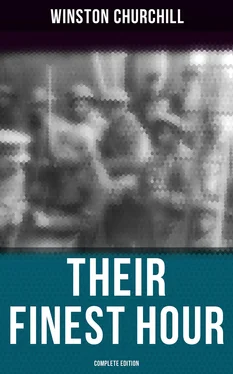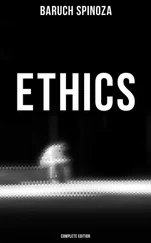Winston Churchill - Their Finest Hour (Complete Edition)
Здесь есть возможность читать онлайн «Winston Churchill - Their Finest Hour (Complete Edition)» — ознакомительный отрывок электронной книги совершенно бесплатно, а после прочтения отрывка купить полную версию. В некоторых случаях можно слушать аудио, скачать через торрент в формате fb2 и присутствует краткое содержание. Жанр: unrecognised, на английском языке. Описание произведения, (предисловие) а так же отзывы посетителей доступны на портале библиотеки ЛибКат.
- Название:Their Finest Hour (Complete Edition)
- Автор:
- Жанр:
- Год:неизвестен
- ISBN:нет данных
- Рейтинг книги:5 / 5. Голосов: 1
-
Избранное:Добавить в избранное
- Отзывы:
-
Ваша оценка:
- 100
- 1
- 2
- 3
- 4
- 5
Their Finest Hour (Complete Edition): краткое содержание, описание и аннотация
Предлагаем к чтению аннотацию, описание, краткое содержание или предисловие (зависит от того, что написал сам автор книги «Their Finest Hour (Complete Edition)»). Если вы не нашли необходимую информацию о книге — напишите в комментариях, мы постараемся отыскать её.
Their Finest Hour covers the period in World War 2 after the fall of France when Britain stood alone, with victorious Germany and Italy engaged in mortal attack upon them, with Soviet Russia a hostile neutral actively aiding Hitler, and Japan an unknowable menace. Churchill labeled the «moral of the work» as follows: «In War: Resolution, In Defeat: Defiance, In Victory: Magnanimity, In Peace: Goodwill»
Their Finest Hour (Complete Edition) — читать онлайн ознакомительный отрывок
Ниже представлен текст книги, разбитый по страницам. Система сохранения места последней прочитанной страницы, позволяет с удобством читать онлайн бесплатно книгу «Their Finest Hour (Complete Edition)», без необходимости каждый раз заново искать на чём Вы остановились. Поставьте закладку, и сможете в любой момент перейти на страницу, на которой закончили чтение.
Интервал:
Закладка:
In Clement Attlee I had a colleague of war experience long versed in the House of Commons. Our only differences in outlook were about Socialism, but these were swamped by a war soon to involve the almost complete subordination of the individual to the State. We worked together with perfect ease and confidence during the whole period of the Government. Mr. Arthur Greenwood was a wise counsellor of high courage and a good and helpful friend.
Sir Archibald Sinclair, as official Leader of the Liberal Party, found it embarrassing to accept the office of Air Minister, because his followers felt he should instead have a seat in the War Cabinet. But this ran contrary to the principle of a small War Cabinet. I therefore proposed that he should join the War Cabinet when any matter affecting fundamental political issues or party union was involved. He was my friend, and had been my second-in-command when in 1916 I commanded the 6th Royal Scots Fusiliers at Ploegsteert (“Plug Street”), and personally longed to enter upon the great sphere of action I had reserved for him. After no little intercourse this had been amicably settled. Mr. Bevin, with whom I had made acquaintance at the beginning of the war, in trying to mitigate the severe Admiralty demands for trawlers, had to consult the Transport and General Workers’ Union, of which he was secretary, before he could join the team in the most important office of Minister of Labour. This took two or three days, but it was worth it. The union, the largest of all in Britain, said unanimously that he was to do it, and stuck solid for five years till we won. The greatest difficulty was with Lord Beaverbrook. I believed he had services to render of a very high quality. I had resolved, as the result of my experiences in the previous war, to remove the supply and design of aircraft from the Air Ministry, and I wished him to become the Minister of Aircraft Production. He seemed at first reluctant to undertake the task, and of course the Air Ministry did not like having their Supply Branch separated from them.
There were other resistances to his appointment. I felt sure however that our life depended upon the flow of new aircraft; I needed his vital and vibrant energy, and I persisted in my view.
***
In deference to prevailing opinions expressed in Parliament and the Press it was necessary that the War Cabinet should be small. I therefore began by having only five members, of whom one only, the Foreign Secretary, had a department. These were naturally the leading party politicians of the day. For the convenient conduct of business it was necessary that the Chancellor of the Exchequer and the Leader of the Liberal Party should usually be present, and as time passed the number of “constant attenders” grew. But all the responsibility was laid upon the five War Cabinet Ministers. They were the only ones who had the right to have their heads cut off on Tower Hill if we did not win. The rest could suffer for departmental shortcomings, but not on account of the policy of the State. Apart from the War Cabinet, any one could say: “I cannot take the responsibility for this or that.” The burden of policy was borne at a higher level. This saved many people a lot of worry in the days which were immediately to fall upon us.
Here are the stages by which the National Coalition Government was built up day by day in the course of the great battle.
THE WAR CABINET
May 11, 1940
Prime Minister, First Lord of the Treasury, Minister of Defence, and Leader of the House of Commons Lord President of the Council Lord Privy Seal Secretary of State for Foreign Affairs Minister without Portfolio
MINISTERS OF CABINET RANK First Lord of the Admiralty Secretary of State for War Secretary of State for Air May 12 Lord Chancellor Chancellor of the Exchequer Home Secretary and Minister of Home of State for the Colonies President of the Board of of Supply Minister of Information May 13 4Mr. Churchill4 Mr. Neville Chamberlain Mr. C. R. Attlee4 Lord Halifax Mr. Arthur Greenwood Mr. A. V. Alexander4 Mr. Anthony Eden Sir Archibald Sinclair4 Sir John Simon [becoming Lord Simon]4 Sir Kingsley Wood4 Sir John Anderson Lord Lloyd Sir Andrew Duncan Mr. Herbert Morrison Mr. Alfred Duff Cooper Conservative Conservative Labour Conservative Labour Labour Conservative Liberal National Liberal Conservative Non-Party Conservative Non-Party Labour Conservative Secretary of State for India and Burma Minister of Health Minister of Labour and National Service Minister of Food May 14 Dominions Secretary and Leader of the House of Lords Secretary of State for Scotland Minister of Aircraft Production President of the Board of Education Minister of Agriculture Minister of Transport Minister of Shipping Minister of Economic Warfare Chancellor of the Duchy of Lancaster May 15 Minister of Pensions Postmaster-General Paymaster-General Attorney-General Lord Advocate Solicitor-General Solicitor-General for Scotland Mr. L. S. Amery4 Mr. Malcolm Macdonald Mr. Ernest Bevin4 Lord Woolton5 Viscount Caldecote5 Mr. Ernest Brown Lord Beaverbrook5 Mr. Herwald Ramsbotham5 Mr. Robert Hudson5 Sir John Reith5 Mr. Ronald Cross Mr. Hugh Dalton5 Lord Hankey5 Sir W. J. Womersley5 Mr. W. S. Morrison Lord Cranborne5 Sir Donald Somervell, K.C.5 Mr. T. M. Cooper, K.C.Sir William Jowitt, K.C.5 Mr. J. S. C. Reid, K.C. Conservative National Labour Labour Non-Party Conservative National Liberal Conservative Conservative Conservative Non-Party Conservative Labour Non-Part Conservative Conservative Conservative Conservative Conservative Labour Conservative
***
In my long political experience I had held most of the great offices of State, but I readily admit that the post which had now fallen to me was the one I liked the best. Power, for the sake of lording it over fellow-creatures or adding to personal pomp, is rightly judged base. But power in a national crisis, when a man believes he knows what orders should be given, is a blessing. In any sphere of action there can be no comparison between the positions of number one and numbers two, three, or four. The duties and the problems of all persons other than number one are quite different and in many ways more difficult. It is always a misfortune when number two or three has to initiate a dominant plan or policy. He has to consider not only the merits of the policy, but the mind of his chief; not only what to advise, but what it is proper for him in his station to advise; not only what to do, but how to get it agreed, and how to get it done. Moreover, number two or three will have to reckon with numbers four, five, and six, or maybe some bright outsider, number twenty. Ambition, not so much for vulgar ends, but for fame, glints in every mind. There are always several points of view which may be right, and many which are plausible. I was ruined for the time being in 1915 over the Dardanelles, and a supreme enterprise was cast away, through my trying to carry out a major and cardinal operation of war from a subordinate position. Men are ill advised to try such ventures. This lesson had sunk into my nature.
At the top there are great simplifications. An accepted leader has only to be sure of what it is best to do, or at least to have made up his mind about it. The loyalties which centre upon number one are enormous. If he trips he must be sustained. If he makes mistakes they must be covered. If he sleeps he must not be wantonly disturbed. If he is no good he must be pole-axed. But this last extreme process cannot be carried out every day; and certainly not in the days just after he has been chosen.
***
The fundamental changes in the machinery of war direction were more real than apparent. “A Constitution”, said Napoleon, “should be short and obscure.” The existing organisms remained intact. No official personalities were changed. The War Cabinet and the Chiefs of Staff Committee at first continued to meet every day as they had done before. In calling myself, with the King’s approval, Minister of Defence I had made no legal or constitutional change. I had been careful not to define my rights and duties. I asked for no special powers either from the Crown or Parliament. It was however understood and accepted that I should assume the general direction of the war, subject to the support of the War Cabinet and of the House of Commons. The key change which occurred on my taking over was of course the supervision and direction of the Chiefs of Staff Committee by a Minister of Defence with undefined powers. As this Minister was also the Prime Minister, he had all the rights inherent in that office, including very wide powers of selection and removal of all professional and political personages. Thus for the first time the Chiefs of Staff Committee assumed its due and proper place in direct daily contact with the executive head of the Government, and in accord with him had full control over the conduct of the war and the armed forces.
Читать дальшеИнтервал:
Закладка:
Похожие книги на «Their Finest Hour (Complete Edition)»
Представляем Вашему вниманию похожие книги на «Their Finest Hour (Complete Edition)» списком для выбора. Мы отобрали схожую по названию и смыслу литературу в надежде предоставить читателям больше вариантов отыскать новые, интересные, ещё непрочитанные произведения.
Обсуждение, отзывы о книге «Their Finest Hour (Complete Edition)» и просто собственные мнения читателей. Оставьте ваши комментарии, напишите, что Вы думаете о произведении, его смысле или главных героях. Укажите что конкретно понравилось, а что нет, и почему Вы так считаете.











